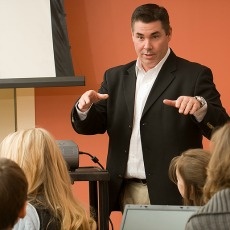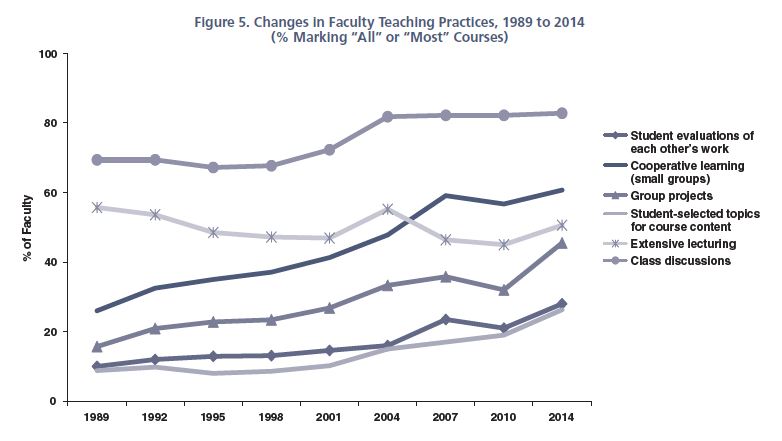Today concludes our countdown of the top 14 articles of 2014. On Wednesday we revealed article number 14 on down to number eight. Today’s post reveals the seven most popular articles of the year. Each article’s ranking is based on a combination of factors, including e-newsletter open and click-thru rates, social shares, reader comments, web traffic, reprint requests, and other reader engagement metrics.
Read more ›CURRENT ARTICLE • December 19
OTHER RECENT ARTICLES
As another year draws to a close, the editorial team at Faculty Focus looks back on some of the top articles of the past year. Throughout 2014, we published approximately 225 articles. The articles covered a wide range of topics – including group work, course redesign, flipped learning, and grading strategies. In a two-part series, which runs today and Friday, we reveal the top 14 articles for 2014. Each article’s ranking is based on a combination of factors, including e-newsletter open and click-thru rates, social shares, reader comments, web traffic, reprint requests, and other reader engagement metrics.
Read More ›A survey of undergraduate teaching faculty has identified a shift toward more learner-centered teaching practices and a corresponding move away from lectures and other teacher-centered styles.
Read More › A recent experience in class left me a bit rattled, and made me wonder if I’ve long been trying to teach an impossible skill. It confronted me with a fundamental question: What’s teachable, and what do students simply have to figure out on their own with the passage of time?
A recent experience in class left me a bit rattled, and made me wonder if I’ve long been trying to teach an impossible skill. It confronted me with a fundamental question: What’s teachable, and what do students simply have to figure out on their own with the passage of time?
Every October, members of the Canadian Forces College’s National Security Program—a master of public administration program for senior military personnel and senior public service professionals—have the opportunity (and privilege) to travel to Ottawa to meet with high-level policy practitioners. The intent of the trip is to allow our students to compare what their in-class readings have taught them about governance and executive leadership with what actually happens in the national capital on a daily basis.
Read More ›“A threshold concept is discipline-specific, focuses on understanding of the subject and ... has the ability to transform learners’ views of the content.” (Zepke, p. 98) It’s not the same as a core concept, although that’s a useful place to first put the idea. “A core concept is a conceptual ‘building block’ that progresses understanding of the subject; it has to be understood, but it does not necessarily lead to a qualitative different view of the subject matter.” (Meyer and Land, p. 4)
Read More › As we face the perpetual challenge of keeping each class session fresh and interactive, I suggest we consider an old idea that never really got stale. Inviting guest lecturers to your classroom has benefits for your learners, for you, and for the guest lecturers. Learners of all ages and experience levels are hungry for variety, and seeing a new face in front of the room can liven up the class; but there are also deeper pedagogical reasons for using guest lecturers. Here are a few to consider.
As we face the perpetual challenge of keeping each class session fresh and interactive, I suggest we consider an old idea that never really got stale. Inviting guest lecturers to your classroom has benefits for your learners, for you, and for the guest lecturers. Learners of all ages and experience levels are hungry for variety, and seeing a new face in front of the room can liven up the class; but there are also deeper pedagogical reasons for using guest lecturers. Here are a few to consider.
Researchers Daniel Smith and Thomas Valentine begin by making an important point. At two-year colleges “the classroom serves as the epicenter of involvement.” (p. 134) The same could be said for commuter campuses as well. Students who attend two-year colleges often do so part-time and regularly do so combining school with work, family, and a host of other responsibilities. The same can increasingly be said of many students who commute to campus to take classes. At many institutions students now spend considerably less time on campus, and so if they are to be engaged with academic life, that involvement pretty much begins and ends in the classroom. So, are faculty using instructional techniques that do involve students in the classroom?
Read More › People text almost everywhere nowadays, and so it shouldn’t surprise us that students are doing it in class. In this study of almost 300 marketing majors at two different universities, 98 percent reported that they texted during class. They reported receiving just about as many texts as they sent. Perhaps most troubling in these findings were students’ attitudes about texting. Here’s a sample:
People text almost everywhere nowadays, and so it shouldn’t surprise us that students are doing it in class. In this study of almost 300 marketing majors at two different universities, 98 percent reported that they texted during class. They reported receiving just about as many texts as they sent. Perhaps most troubling in these findings were students’ attitudes about texting. Here’s a sample:
The faculty members in the chemistry department are confused.
Read More ›





